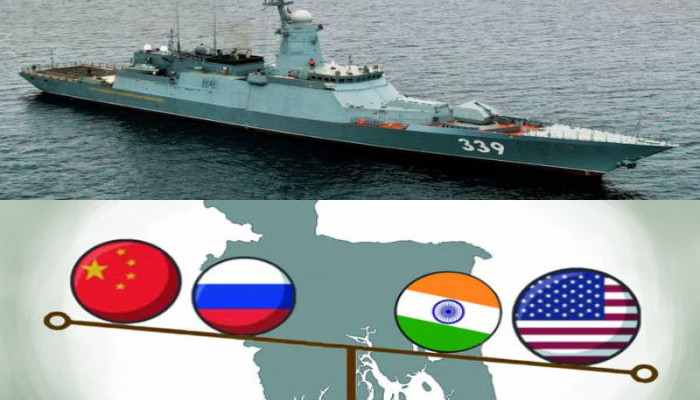Russian warships dock at Bangladesh’s Chittagong port days after Bangladesh army cheif's Moscow visit
- In Reports
- 06:12 PM, Apr 16, 2025
- Myind Staff
On Sunday, three Russian naval ships namely Admiral Tributs, Admiral Panteleyev, and the tanker Pechenga, docked at Bangladesh’s Chittagong Port. Bangladesh had officially described the visit as a routine “friendly port call”. However, the timing of the event has drawn international attention, particularly from China and India.
The naval stopover occurred shortly after Bangladesh Army Chief General SM Shafiuddin Ahmed visited Moscow. This visit showed a strengthening military relationship between Dhaka and the Kremlin. The development is perceived as part of a broader attempt by Bangladesh to diversify its defense partnerships beyond traditional allies.
Importance of the Port Visit
The Russian warships are expected to remain docked at Chittagong, which is Bangladesh’s principal seaport, for several days. The official reason by Bangladesh stated logistical replenishment and naval diplomacy. The visit occurring directly after General Ahmed’s return from Russia is not being interpreted as a mere coincidence.
This move has led to expansion of Russia’s military in South Asia, going beyond its time-tested partnership with India. For Bangladesh, the visit is a calculated move in defense policy and part of a larger attempt to balance strategic ties by reducing overdependence on a single nation.
“Friendly port call” or not, the presence of Russian naval vessels in such a strategically important location is anything but normal. It positions Russia as a new player in the Bay of Bengal’s changing geopolitical tensions.
Why This Could Worry China
China is likely not very pleased with Russia’s visibility in Bangladesh’s defense area. Between 2018 and 2022, China supplied nearly 74% of Bangladesh’s total arms imports, according to data from the Stockholm International Peace Research Institute (SIPRI). Beijing has been Dhaka’s top military supplier for a long time. It has been supplying submarines and corvettes and even tanks, fighter aircraft, and frigates.
Beyond defense equipment, China has also fixed its roots in Bangladesh through massive infrastructure investments under its Belt and Road Initiative (BRI), gaining geopolitical advantages.
Russia’s sudden naval outreach appears to be a calculated move by Dhaka to reduce its reliance on Beijing. The visit of Russian warships, as well as increased military exchanges with Moscow, could be a strategic plan that directly challenges China’s dominance in the region.
Implications for India
For India, the Russian port call in Bangladesh is a complex situation. India may view Russia’s expanding presence in the Bay of Bengal as a potential threat to China's growing influence in Dhaka. However, India and Russia have historically shared deep-rooted defense and energy cooperation, and Moscow continues to be one of India's major arms suppliers.
Russia’s presence at a neighbouring port could be perceived as an indirect advancement of interests by India. As India has strong ties with both Moscow and Dhaka, it is likely that India was informed about the movement of these warships in advance.
However, this development also brings certain anxieties in terms of strategy, as India has consistently supported a minimal external military footprint in the Bay of Bengal and encouraged an “Indian-led security architecture” in the Indian Ocean region. Therefore, the arrival of Russian naval vessels, despite the long-standing diplomatic history, has added a new issue of complexity to India’s regional security.
Indian officials will be particularly attentive to whether this port visit remains a one-time occurrence or turns into a recurring event. A continued Russian naval presence could affect the maritime balance in the Bay of Bengal, which is a region traditionally dominated by the Indian Navy and increasingly patrolled by China.
As regional nations rearrange their alliances and naval forces start holding in important ports like Chittagong, the Bay of Bengal is transitioning into a hotspot of geopolitical tensions.







Comments